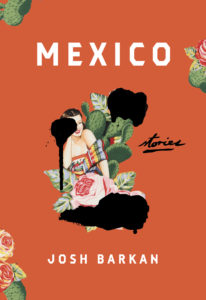Hypertext Magazine asked Josh Barkan, author of MEXICO: STORIES, “What question do you wish you’d been asked about your work?”
There are millions of books out there—so what are you trying to tell us that is new? Why should we bother to read your work?
James Alan McPherson, who I studied with at the Iowa Writers’ Workshop, used to emphasize that what we look for in a good story is the “weight” of the story. By that, he meant that there is something of substance, something moral at stake in the work for the characters. I’ve always been interested in writers like Joseph Conrad, in his work Heart of Darkness, or of Dostoevsky in Crime and Punishment, where it feels like the immense ethical issues of the writer’s time are explored. For Conrad it was colonialism. For Dostoevsky a mix of the crimes and psychology of the individual, and also of the decadent state. Is it okay to kill someone who no one will miss? There is never a new story, in that the ethical issues of what it means to live and to make moral choices have been established long ago. But in each period we have new variations, or new parameters, which affect those moral decisions. So for Orwell, new technology—the possibility of an all-seeing state, as in 1984—would determine the willingness of the individual to seek out and to maintain their freedom.

My books have been highly varied. In Before Hiroshima, the first half of the book is a novella about a character in World War II in Japan, who sees a pattern of bombs around the cities of Niigata, Kyoto, Hiroshima, and Nagasaki. He has a gut feeling that something horrible is about to happen. But his superior officer is unwilling to listen to his hunch that these cities are about to be destroyed. In that collection I was interested in whether the individual has the personal conviction to disobey his superior officer when he knows the superior officer is hiding something that shouldn’t be hidden. More broadly, I was interested in the difficulty of acting upon our convictions.
In my novel Blind Speed, what I feel was radically new was less the ethical issues of the book but the fusion of so many things together—historical reenactments in Boston, modern-day political campaigns, an exploration of the rock music scene of the ‘90s, a spoof on the cult life of the Maharishis in Iowa and of palm readings, the dangers of anti-environmentalism, questions of failure and ambition, and a mix of humor, seriousness, and characters from around the globe (including a male nurse from Jamaica who was once a philosopher in Kingston). So, part of what I have wanted to explore is not only the mood of a period, and the ethics of a period, but also the feeling of fusion, of so many different things being all thrown together, which I feel is something that defines our current period.
In Mexico: Stories I was continuing with that fusion, with a number of expats from the United States living in Mexico. Here, what I was trying to do is to break down stereotypes. The collection has a chef, an architect, two painters, a mime, a classical bass player, a beauty queen—all caught up in some of the cartel and other violence that is taking place in Mexico. I wanted people to shift their perceptions of who is being affected by the violence, to realize that all socioeconomic groups are being affected—not just drug dealers and consumers of drugs.
In short, what I have tried to do in all my work is make people look again, to doubt what they have thought they already know—whether it’s the history of Boston, or the way they perceive various international locations. I want people to do a double take, to be surprised, to feel they have never quite seen the world the way they did before they read one of my books.
Josh Barkan has won the Lightship International Short Story Prize and has been a finalist for the Grace Paley Prize for Short Fiction, the Paterson Fiction Prize, and the Juniper Prize for Fiction. He is the recipient of a fellowship from the National Endowment for the Arts, and his writing has appeared in Esquire. He earned his MFA from the Iowa Writers’ Workshop and has taught writing at Harvard, Boston University, and New York University. With his wife, a painter from Mexico, he divides his time between Mexico City and Roanoke, Virginia.
